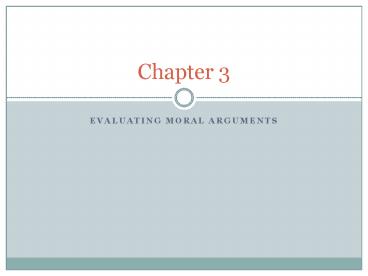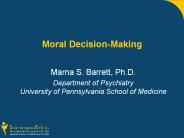Evaluating moral arguments - PowerPoint PPT Presentation
1 / 28
Title:
Evaluating moral arguments
Description:
... subjective relativism, cultural relativism, emotivism, and ethical objectivism. ... If someone were to betray your trust or to physically injure you for no other ... – PowerPoint PPT presentation
Number of Views:319
Avg rating:3.0/5.0
Title: Evaluating moral arguments
1
Chapter 3
- Evaluating moral arguments
2
REVIEW
- Last time, we discussed subjective relativism,
cultural relativism, emotivism, and ethical
objectivism. - We considered arguments for and against each
view. - While ethical objectivism is the theory that best
accords with most intuitive conceptions of
morality, many thinkers have suggested
interesting reasons to embrace alternate views.
3
REVIEW
- If someone were to betray your trust or to
physically injure you for no other reason than
his/her own pleasure, you might think that person
has done something wrong. - Yet, if the agent who has acted against you, acts
in accordance with his/her personal views or
those of his/her particular culture, a relativist
could argue that the agents actions were
justified and it was morally permissible for him
to hurt you.
4
REVIEW
- A moral skeptic or an emotivist might argue that
there is no such thing as a morally impermissible
action and that when one says that an action is
morally wrong, s/he isnt making any claim at
all, but rather something else is going on.
5
REVIEW
- An ethical objectivist would use some objective
criteria to evaluate an action. S/he might argue,
for instance, that any time someone harms another
for no other reason than his/her own pleasure,
the agent performs an act that is morally wrong. - In order to determine and evaluate such criteria,
one needs to apply critical reasoning.
6
WHAT IS MORAL REASONING?
- Moral reasoning is ordinary critical reasoning
applied to moral arguments. - Critical reasoning (also called critical
thinking) is the careful, systematic evaluation
of statements and arguments.
7
STATEMENTS
- A statement (or claim) is the assertion that
something is either true or false. The following
are all statements - Murder is wrong
- 1 1 2
- Shakespeare wrote The Tempest
8
ARGUMENTS
- When at least one statement attempts to provide
reasons for believing another statement, we have
an argument--a group of statements, one of which
is supposed to be supported by the rest.
9
Statements and Arguments
- The statement that is being supported by the
others is the conclusion. - The supporting statements are called premises.
10
IDENTIFYING ARGUMENTS
- An argument has something to prove.
- The most reliable way to identify arguments is to
look for the conclusion first. - Next, establish that there is a connection
linking premises to the conclusion. - A cluster of unrelated claims is not an argument.
11
ARGUMENT OR NOT?
- The number of abortions performed in this state
is increasing. More and more women say that they
favor greater access to abortion. I disapprove
of abortion. - This is NOT an argument. There is no clear
connection among its statements.
12
ARGUMENT OR NOT?
- The number of abortions performed in this state
is increasing. More and more women say that they
favor greater access to abortion. Clearly, the
trend among women in this state is toward greater
acceptance of abortion. - This IS an argument. There is a clear
conclusion that is supported by the other
statements in the paragraph.
13
Two Forms of Argument
- A deductive argument is supposed to give
logically conclusive support to its conclusion. - An inductive argument is supposed to offer
probable support to its conclusion.
14
Deductive Arguments
- The following deductive argument is valid
- If its premises are true, then its conclusion
- must be true
- All human beings are mortal.
- Socrates is a human being.
- Therefore, Socrates is mortal.
- A valid argument with true premises (such as
- the example above) is said to be sound.
15
Deductive Arguments
- An invalid deductive argument is an argument in
which the premises do not offer conclusive
support for its conclusion - All ducks are mortal.
- Socrates is a human being.
- Therefore, Socrates is mortal.
- Validity and invalidity are matters of form,
- not content, of an argument.
16
Common Deductive Argument Forms
- VALID FORMS
- Affirming the antecedent
- Denying the consequent
- The hypothetical syllogism
- INVALID FORMS
- Denying the antecedent
- Affirming the consequent
17
Affirming the Antecedent
- Takes the form
- If p, then q.
- p.______
- Therefore, q.
- This form is always valid if the premises are
- true, then the conclusion has to be true.
18
Denying the Consequent
- Takes the form
- If p, then q.
- Not q._______
- Therefore, not p.
- This form is always valid if the premises
- are true, then the conclusion has to be true.
19
The Hypothetical Syllogism
- Takes the form
- If p, then q.
- If q, then r.
- Therefore, if p, then r.
- This form is always valid if the premises
- are true, then the conclusion has to be true.
20
Denying the Antecedent
- Takes the form
- If p, then q.
- Not p_______
- Therefore, not q.
- This form is always invalid the
- conclusion can be false even if the premises
- are true.
21
Affirming the Consequent
- Takes the form
- If p, then q.
- q.________
- Therefore, p.
- This form is always invalid the
- conclusion can be false even if the premises
- are true.
22
Strong Inductive Arguments
- The following inductive argument is strong it
gives probable support to its conclusion such
that, if its premise is true, its conclusion is
also likely to be true - Ninety percent of men at this college have
combined SAT scores over 1400. Therefore, Julio
(a student at this college) probably has a
combined SAT score over 1400. - A strong inductive argument with true premises is
said to be cogent.
23
Weak Inductive Arguments
- The following inductive argument is weak it does
not give probable support to its conclusion, and
even if its premise is true, its conclusion is
not more likely to be true - Ten percent of the men at this college have
combined SAT scores over 1400. Therefore, Julio
(a student at this college) probably has a
combined SAT score over 1400.
24
Practice Questions
- Which of the following are arguments?
- I like puppies. They are wonderful and playful.
Sometimes they eat apples. I like apples too. - We should stop testing cosmetics on puppies. They
are animals, and non-human animals have rights
just like human beings do. - Everyone who likes puppies should get in A in
this course. John likes puppies, so John should
get an A. - 4. Hooray, the Lions beat the Packers! I hate
the Packers! Everyone knows that they are just
terrible.
25
Practice Questions
- Identify the Conclusion
- 1. John may have stolen that hundred dollar bill,
but he was hungry and now, his financial troubles
are over. Its unlikely that he will steal again,
so John should not go to jail. - If George W. Bush is a democrat, then all
diamonds are purple. George W. Bush is a
democrat. Therefore, all diamonds are purple. - Its probable that the Earth is round, since most
people believe the Earth is round. - 4. As its going to rain, you shouldnt have
your pool party today.
26
Practice Questions
- Deductive or Inductive
- 1. John may have stolen that hundred dollar bill,
but he was hungry and now, his financial troubles
are over. Its unlikely that he will steal again,
so John should not go to jail. - If George W. Bush is a democrat, then all
diamonds are purple. George W. Bush is a
democrat. Therefore, all diamonds are purple. - Most people believe the Earth is round, so its
probable that the Earth is round. - 4. Since its going to rain, you shouldnt have
your pool party today.
27
Practice Questions
- Valid or Invalid
- 1. All twiks are twoks. John is a twok.
Therefore, John is a twik. - If George W. Bush is a democrat, then all
diamonds are purple. George W. Bush is a
democrat. Therefore, all diamonds are purple. - If Martha Custis was the first First Lady, then
George Washington was the first U.S. president.
George Washington was the first president.
Therefore, Martha Custis was the first First
Lady. - 4. If John is your brother, then Tim is my
cousin. If Tim is my cousin, then Eric is my
uncle. Therefore, if John is your brother, then
Eric is my uncle.
28
Practice Questions
- Sound or Unsound
- 1. All U.S. presidents have been male. Gerald
Ford was a U.S. president. Therefore, Gerald Ford
must have been male. - If George W. Bush is a democrat, then all
diamonds are purple. George W. Bush is a
democrat. Therefore, all diamonds are purple. - No fish are mammals. Whales are fish. Therefore,
whales are not mammals. - 4. If grapes are oranges, then some oranges are
of the genus Vitis. No oranges are part of the
genus Vitis. Therefore, grapes are not oranges.































